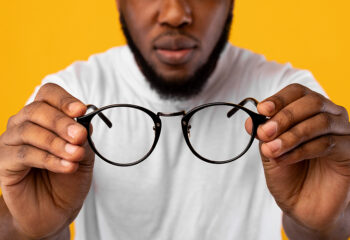Many rise to the challenge of vision loss, but very few break world records and earn gold medals to prove it. Gia Pergolini did, in the 100-meter backstroke, as a member of Team USA at the Tokyo Paralympic Games in August 2021. At seventeen, she certainly showed us how it’s done. Gia set her sights on gold and was prepared for it by a competitive swimming career that began at age five. Along the way she picked up two silver medals and broke four world records. A visual impairment would not deter this world-class athlete.
Video of Gia Pergolini’s gold medal win.
I spoke with Gia one Saturday afternoon following her swim practice and was particularly interested to learn more about her point of view. Here are the questions I asked, followed by the answers, in her own words.
How do you explain or describe your visual impairment to someone?
“I usually just say, in the simples words as possible, because I don’t know what good vision is. I explain, I can see, but it’s very, very blurry. I can see who is in front of me, but I can’t tell what eye color they have, or if they have makeup on, or not. I also say that I have blind spots in the middle of both my eyes and if I position my eye in a certain way, I can actually see the blind spots.”
The visual impairment Gia describes is the result of Stargardt Disease, a macular degeneration, causing progressive central vision loss while leaving peripheral vision in tact. She was affected from a very young age.
What are the technologies you use everyday?
“Obviously, I love my computer and my phone, I think those go hand in hand. Just the ‘zoom in’ features on my phone, especially nowadays a lot of my work for school is online, so my Mac and Apple phone can zoom in. The ‘zoom In’ feature on my iPhone has saved my life. I did not know that existed until my friend, Anastasia Pagonis, (and roommate at the Tokyo games) actually taught me this. And I use my Zoom Mag video magnifier, if I have to take tests or quizzes at school.”
You have benefited from the services of CVI, Center for the Visually Impaired, in Georgia, how did they help?
“They were super helpful. Not a lot of the teachers at my school were educated on this, they didn’t have a student like me. CVI reached out to them and explained what was going on and told them what they could do to help me in the classroom. They showed me new technology the would also help me in the classroom. They were just hugely helpful because they were there to help guide my parents through this weird and confusing time.”
How do you find the accessibility of your schoolwork today?
“It has improved a lot, CVI was so good that I found what worked for me and I just stuck with it. Now in the classroom I just need my video magnifier and the computer and I’m all good. I’m at a place where I’m comfortable in the classroom.”
Vision loss is often misunderstood by people not experiencing it, what would you like them to know?
“ I think they should just keep an open mind and listen. I feel that is the best advice you can give to someone who is not educated on something. Try to be in that person’s shoes, veer from stereotypes, because not everyone who is ‘blind’ has dark glasses and a cane, or uses a guide dog.”
What advice would you give about dealing with a visual impairment?
“I would say, there is always a way to work around things. It may not seem fair, but you can get so much out of it with positivity. Like my sport, I would not be where I’m at without my visual impairment. So just look at the bright side, and I know it might be tough, but if you need help find someone to talk with or find an organization that can help. There are many resources online”
Gia Pergolini sets an empowering example for people of all ages. Find the things that work and practice to improve your ability. There is so much we can learn from, and teach, each other. Help elevate awareness, and educate others, to the fact that people are often visually impaired, even though it’s not visible. Most important, if you need help, get it.
Thank you Gia!







